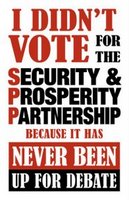Coming on the heels of two in-depth information nights, a summertime Suncor gas station shut-down, a paper trail investigation and multiple op-ed pieces, Anti-War @ Laurier called a regional day of action against the Security and Prosperity Partnership (SPP) on November 3.
Activist groups and concerned citizens from across southwestern Ontario turned to the streets, handed out fliers and occupied buildings all in an effort to raise awareness about this tri-lateral and anti-democratic partnership.
For my part, I was the media liaison for AW@L’s action that started at 7:30 a.m. with the fliering of employees as they arrived at their work, and our target, Manulife Financial in Waterloo. After giving out all of the fliers, we moved into the lobby of the building, and communicated our demands through the security agents that intercepted us.
AW@L’s demands were for the full disclosure of Manulife’s involvement in the North American Competitiveness Council (NACC) and the SPP, an immediate cessation of that involvement, and the commencement of open, truthful, and transparent dialogue between the company, its employees and shareholders, and the communities in which it operates.
These demands are informed by the knowledge that Manulife’s CEO, Dominic D’Alessandro, sits as the insurance giant’s representative on the driving force behind the SPP, the NACC. Manulife Board members, Thomas D’Aquino and Robert J. Harding, also sit on the NACC as the CEO of the Canadian Council of Chief Executives (CCCE) and the chairman of Brookfield Asset Management Inc, respectively.
Clearly Manulife is deeply entrenched in the efforts of deep integration of North American regulatory agendas and policy harmonization, but their specific role in unclear.
As banners flapped in the wind outside and a group of protesters filled the lobby with some progressive chatter and their backpacks, a representative from the company told us a spokesman was willing to speak on the phone. AW@L negotiator Jacob Pries then spoke to Manulife media relations agent Tom Nunn to rely our demands.
Unfortunately, the Mr. Nunn was only interested in dialogue with corporations and governments and not the public that permits the company to exist in their community and country. When Jacob Pries stated, “that it seemed to me that Manulife is not actually interested in dialogue with those that are being impacted by the SPP,” Mr. Nunn simply replied, “right”. Responsible corporate transparency was not to be seen on this day.
After learning of this disappointing news, the lobby occupiers assembled and discussed their next move. The consensus that was reached was to not lock down in the lobby, but to move outside and continue to flyer people arriving at the property and to move onto public lands beside the fully windowed south wall of the building where employees could continue to be targeted.
The media that arrived to cover the action shared our fate, as photographers and videographers were instructed to leave the building immediately upon arrival. This aura of secrecy did, however, work in our favour as both the print and video stories that emerged were critical of the involvement of Manulife in the SPP.
This sort of coverage on this topic is new. Usually all reports around the SPP, focus on the police repression of “violent” protestors (or agent provocateurs) and condescending comments about Jelly Beans. Hopefully all media will continue to investigate the impacts and implications of the SPP and actually report on them.
Though our goals to have Manulife remove itself from the NACC have not yet been met, we were able to raise awareness around the SPP in the community and among employees, some of whom filled out the from on peaceculture.org which sent a message to Mr. D’Alessandro relating to the SPP.
The media coverage was decent and the messages we’ve received form people across the country are inspiring. Citizens of North America cannot afford to ignore the SPP as the impacts and implications will reach into governmental policy and everyday life.
AW@L’s SPP campaign is not going away, as the structures that support these types of agreements are not disappearing – the end of the SPP mandate does not indicate an end of anti-democratic deep integration and regulatory harmonization.
As an April 2008 document from the NACC points out: “It is not the name [of the agreement], it is the structure [that underlies it].”
Dan Kellar is a PhD student at the University of Waterloo and an active member of the activist group AW@L.



